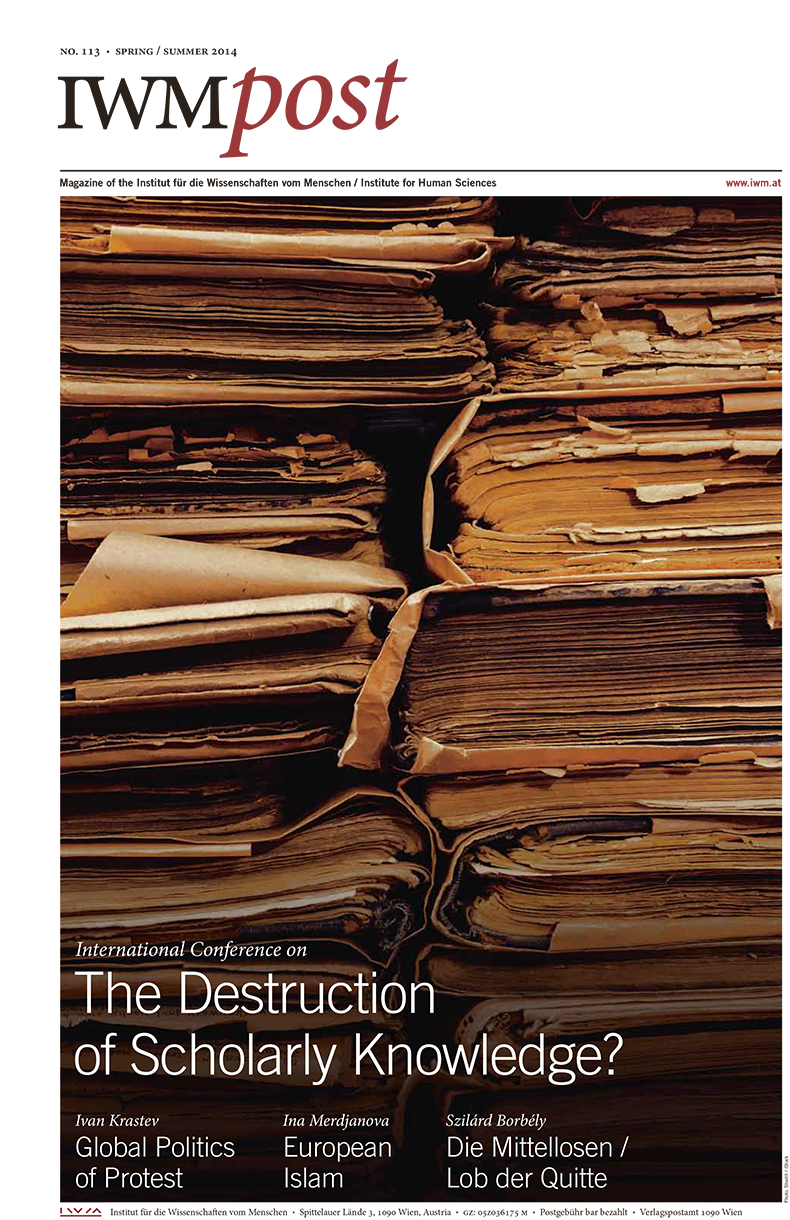The current sense of crisis seems to be omnipresent these days. As Nancy Fraser vividly illustrated during the Patočka Memorial Lecture 2013, the present crisis has political and economic, as well as ecological and social dimensions. Given the growing tendencies of commercialization and bureaucratization, an international conference in Vienna discussed the question whether scholarly knowledge itself is in a time of crises. The contributions by Agata Lisiak, Wendy Hui Kyong Chun and Stefan Collin in this issue are thus devoted to the challenges traditional media and knowledge institutions are facing today.
Another focal point deals with the crisis of democracy. Whilst Ivan Krastev takes the worldwide protest movements of the past few years as a starting point to think about new forms of political resistance, Jan-Werner Mueller focused in his IWM Lectures in Human Sciences, summarized by Matthew Specter, on the phenomenon of populism. As the analysis of the parliamentary elections of 2014 by András Bozóki shows, this factor plays a key role in Hungarian politics. Populist strategies are also the topic of Carl Henrik Fredriksson’s article which explores the difficulties in creating a common European public sphere by referring to the “Turkish Siege of Vienna” in 1683. The essay written by Ina Merdjanova on the history of European Islam in the Balkans particularly refutes the prejudice of Islam being incompatible with democratic values.
The rediscovery of an independent, East European model of liberalism that goes beyond a purely economic understanding is at the heart of Jarosław Kuisz’s article. A workshop on the occasion of the 60th birthday of Cornelia Klinger discussed the contemporary relevance of the concept of patriarchy. As the contributions by Susanne Lettow, Andrea Roedig, Birgit Sauer and Ewa Majewska show, concepts such as patriarchy or gender are still essential when it comes to critically reflecting on power relations and social inequalities. The article by Erna Appelt on the Austrian care regime in times of neoliberal modernization is such an example.
In memoriam Szilárd Borbély, who was a Paul Celan Visiting Fellow in 2013, this issue also includes an obituary by János M. Kovács as well as an excerpt from this book The Dispossessed.
Download the IWMpost 113 as a PDF
Contents
Challenges to Democracy
The Global Politics of Protest / by Ivan Krastev
“Vienna Has Fallen!” / by Carl Henrik Fredriksson
Free and Unfair: The Hungarian Elections / by András Bozóki
The Destruction of Scholarly Knowledge
Threats to Scholarly Knowledge / Report by Agata Lisiak
Knowledge Technologies: Threat = Promise? / by Wendy Hui Kyong Chun
Knowledge Institutions under Pressure / by Stefan Collini
IWM Lectures in Human Sciences
We the People: On Populism and Democracy / Lecture by Jan-Werner Mueller / Report by Matthew Specter
Jan Patočka Memorial Lecture
A Feminist Critique of Capitalism as a Theory of Solidarity? / Lecture by Nancy Fraser/ Report by Ewa Majewska
Events in Retrospect
Ursachen von Ungleichheit
Kritik des Patriarchats / Bericht von Susanne Lettow, Andrea Roedig und Birgit Sauer
Der Preis neoliberaler Modernisierung / von Erna Appelt
In Memoriam Szilárd Borbély
Szilárd Borbély 1963–2014 / by János Mátyás Kovács
Lob der Quitte: Ein Ungarnbild / von Szilárd Borbély
Die Mittellosen: Ist der Messias schon weg? / von Szilárd Borbély
Fellows and Guests
Religion and Secularism
European Islam: Lessons from the Balkans / by Ina Merdjanova
Books, Articles and Talks
Central Eastern Europe in Transition
The Liberalism of Small Nations / by Jarosław Kuisz
Varia
Upcoming events

